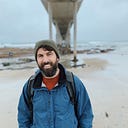Greene Screene: Nomadland
Great pieces of art not only open your eyes to parts of the world you’re ignorant of, but enlighten you on your own perspective of it.
Over the past year and a half, we’ve all felt lonely and isolated in our homes, complaining about toilet paper and not being able to drink in public. But there are giant swaths of the population who have been living in isolation throughout this country for years, for decades, for ever, refugees from an unforgiving capitalist system that doesn’t need or want them. “Them” being the operative word — these people aren’t like us.
In Nomadland, director Chloé Zhao illuminates a few of these people and doesn’t find distant strangers, but a heartfelt community, a group that helps each other because it’s the only way to live with any real meaning. These nomads have stronger bonds to their vans, their homes, than most of us will ever know with our condos, apartments, and houses. It is a tough, unforgiving lifestyle, but as one woman says, “it is a lifestyle of freedom, of beauty, of connection to the Earth.”
In the film’s most maligned scene, Fern’s sister Dolly questions why Fern couldn’t just stay with her and her husband, bemoaning that ever since she was a kid, Fern was always a loner, she was always different. On its surface, this moment seeks to give a reason for Fern’s dislocation, for her struggles — to simplify or caricaturize her. But this doesn’t come from Fern. It comes from Dolly, from us, an outsider perspective, from greater/lesser society that continually teaches us that being a loner, being different is a flaw you must correct, absolving us of any responsibility so we can sleep at night. In so doing, Dolly only proves why Fern has struggled to find a place to belong in this world — we lead with judgment. We don’t empathize with her grief, with the fact that the only person she ever belonged with is gone. We don’t try to belong with Fern. We ask Fern to change, not ourselves.
So Fern must leave, must return to her van where it’s safe. She feels safer in a van where she could freeze to death than with her family. I don’t blame her.
Throughout the film there are beautiful images of national forests and desert landscapes followed by jarring cuts back to Fern scrubbing our shit from toilet stalls, our ketchup stains from counters, and building our infernal Amazon boxes each Christmas. Fern and people like her have done more for this country than many of us can fathom — she is essential to our way of life.
The fern is one of the world’s most ancient plant species, if not the oldest. This means the fern is one of the most resilient. It has survived far longer than us. Fern, and her fellow nomads, are a vanguard, lighting a path forward marked by togetherness. It’s so hard not to lead with judgment — mine is littered all over this review. But I hope to replace judgment with forgiveness, of myself, of each other, so that I may do a better job of following, of listening, of being more like Fern.
